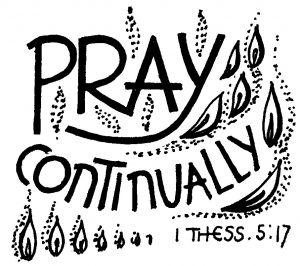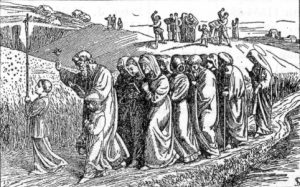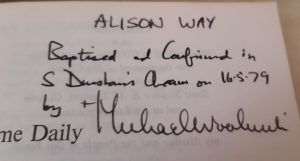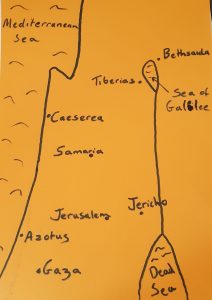2 Corinthians 6:1-13, Mark 4:35-41
Video Reflection available here: https://youtu.be/-mLKQ6tHdKk
We are going to listen to a hymn first – Will your anchor hold? https://www.youtube.com/watch?v=18kBouNNoqI The sentiments of the hymn we have just heard sung Will your anchor hold – play to the themes I am going to talk about today. It is a big favourite of mine though not very Anglican!! I only came across it during my training for the ministry in Wales and it is I believe regularly sung by the boy’s brigade. It is a great one for a crowd singing enthusiastically as this is not the kind of hymn to sing quietly – but with gusto and passion!!
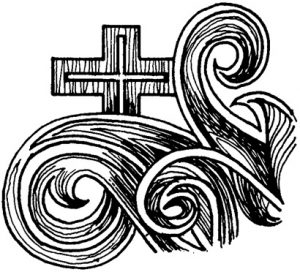 This hymn points us to the bigger picture, the context of our lives in the storms of life, and the reality that in Jesus we have an anchor that keeps the soul, steadfast and sure as the billows roll. Fastened to the rock which cannot move, grounded firm and deep in the Saviour’s love. And it is living in stormy times that I am going to talk about today. Sometimes in life there is a clear path and an obvious objective to aim for. Things seem certain, well ordered, and inspiring. Basically, all is well with our world. At other times, it seems like life is very confused and messy and difficult, with meaningless running round in circles, lots of frustrations, pain and more questions than answers. We have had a lot of this in recent times!!!
This hymn points us to the bigger picture, the context of our lives in the storms of life, and the reality that in Jesus we have an anchor that keeps the soul, steadfast and sure as the billows roll. Fastened to the rock which cannot move, grounded firm and deep in the Saviour’s love. And it is living in stormy times that I am going to talk about today. Sometimes in life there is a clear path and an obvious objective to aim for. Things seem certain, well ordered, and inspiring. Basically, all is well with our world. At other times, it seems like life is very confused and messy and difficult, with meaningless running round in circles, lots of frustrations, pain and more questions than answers. We have had a lot of this in recent times!!!
For me, the gospel reading we heard earlier, speaks into the messy confused and difficult side of all our lives with its tales of storms and the fishermen disciples. In the face of the storm, the disciples were not at all sure what to do, suddenly very fearful and at sixes and sevens….. Literally they move from relative calm to a great commotion and much as we might wish it to be otherwise, the truth is that we all have stormy times, messy confusing times like this, which come on us without any warning! Sometimes caused by something trivial and short lived and at other times caused by events that feel like our whole world has fallen apart. Today I want us to think more deeply about this story of the disciples in the storm in the context of that storminess and messiness in our lives, and see what we can learn from it.
The storms on the Sea of Galilee were well known to the fishermen. The fishermen that Jesus had chosen to be his disciples. These storms were an unwanted and scary part of life, infamous rather than famous. No doubt the disciples knew of other fishermen or even members of their own families who had lost their lives through one of these storms. We may well find this a bit surprising as the sea of Galilee is a big lake – but it is the truth… Something about the surrounding lands and the prevalence of high wind. Within Hebrew culture, there was also an endemic fear of water. No coincidence that the Old Testament is packed with sea monsters – Leviathans….. in case you have ever wondered. Like modern day workers in the fishing industry the disciples would have had a very healthy respect for the waters they worked. They worked long before there was any real prospect of being rescued, before life jackets, life rafts and air sea rescue!!
I think to understand this story of the disciples in the storm at a deeper level – we need to apply this idea of storms more widely. Rather than just limit it to the power of the weather. At the lowest level, Storms are scary, at times life threatening, bringing chaos and destruction in their wake and a real loss of order. We have many circumstances in our lives that fit this description, not just adverse weather conditions and natural disasters, but also bereavement, redundancy, illnesses and chronic debilitating conditions, and dare I say it pandemics etc!!! Difficulties in relationships and families are all really types of storms, if you think about what they do – they are scary, bring chaos, destruction, loss of order, and life feels like it is not worth living. These modern day storms can shake us to the core just as the original storm shook the disciples.
In the year 2000 – I was suddenly made redundant from the Software Company where I had worked for over 9 years. Clouds had been gathering round this organisation for some time and redundancy had been threatened a couple of times previously, as the firm organised and re-organised but continued to lose money. When it came in the end, it came very suddenly and very decisively as the firm was engulfed by another organisation. I fell out of favour with those that then wielded the power and that was that!
It felt like the definition and purpose of my day to day existence had vanished overnight. I was put on ‘gardening’ leave, so I did not do any more work but could not start another job until that was finished (though job-hunting was permitted obviously). I discovered pretty rapidly that in the week, I didn’t have a reason to get up in the morning or to do anything very much at all. Life lost its shape and coherency. I went from being enormously busy all the time, to not having enough to do!! I also learnt pretty graphically who were really my friends. Those who rang and came round, and provided moral support. I found out the hard way those who found excuses for not trying to help or even be in touch, justifying this by saying they didn’t know what to say in the circumstances. I discovered how much we define ourselves by what we do rather than who we are as God’s beloved children too.
But alongside all this, I found that I had more time to read, to pray and to walk my route of Christian discipleship, I found very great consolation in my life in the church which was one of the few things that stayed the same. Sundays provided a great anchor point and refreshment. I established a pattern over what turned out to be just a 10-week period when I wasn’t employed. Thankfully that set me spiritually into such a better place, and this continued after I got another job. It was a place and a pattern where God got much more of a look in. I am sure that this experience helped me to follow my calling which I was exploring at the time, and I started to train for the ministry about 2 years after this
Even though it was very grim at times, I was very aware of Jesus in the boat in the storm of my redundancy!!! Through the power of the Spirit I was never alone. Jesus was in the storm with the disciples, and I find that very consoling. Through the Holy Spirit, Jesus left with us, we are never alone, even in the most difficult and stormiest of times. As fellow Christians on the journey of life, we should not be surprised by what I have just said about the Holy Spirit being with us and working in us even in the most difficult times. And yet that is not what the world at large might expect us to say!!
When I first became a Christian back in the day, there was a sense that you became a Christian and everything was going to be alright. It was the easy option, possibly even a bit of a cop out. It was a meal ticket to happiness, or at least that was how it was portrayed. Everything in the garden was going to be rosy! Difficult times were to be a thing of the past. I am not sure how well we have changed that wider perception, but I do think it is changing. Christianity isn’t a meal ticket to happiness, or a guarantee for no difficult times and as our first reading showed us with the struggles of St Paul it certainly isn’t the easy option!
The wonderful things about being a Christian include massive, undeserved forgiveness for sins; God’s peace and spirit being with us, deep joy and the freedom we experience in worship; the opportunity to know Jesus through the power of the Holy Spirit that is with us in every breath! and of course, the hope of eternal life which gives greater meaning in everything. I realise now for example, I would much rather have my sins forgiven, than be happy all the time. Likewise, I would much rather experience God’s presence through the spirit and the inner peace that brings than be happy all the time.
I think it is much more honest to admit that some very bad things happen to good people. Some sad awful and heart-rending things happen to people. Things they have not done anything to deserve. Through it all God is still with them and loves them as they are through the power of his Spirit. God still wants to use them to further his kingdom, but these awful storms happen. Yet sometimes in our brokenness, in the stormiest of times, the spirit is given more room to work in us and this will set us free!
The disciples learnt from the storm experience and had one of the most impressive demonstrations of Jesus’ love for them, as he rapidly stilled the storm and restored peace and calm. They went away from this incident – aware in a new way of who Jesus was and how he worked. I have also known God work through the storms in my life too, particularly through the times round my redundancy I can see how God was with me and I was changed by the power of the spirit working in my life. Also, how God worked in a new and deeper way. A way that in the usual busyness of my existence I might never have given the Spirit the space to dwell so richly. It is easy to look back and see the work being done in stormy times by the spirit from a safe distance and to be thankful. It is not so easy in the midst of stormy times – when it is a struggle to get up in the morning. It is at these times, when all we can do is ask the Spirit to dwell in us richly and to get us through the day. To be honest in our prayers about how we feel and to be reassured that as Jesus was in the storm with his disciples, the Holy Spirit is with us and surrounds us with God’s love in everything no matter how bleak it may seem.
As I started, I end by saying that life can be frustrating, messy and confusing, as we all experience good times and stormy bad times. Storms (both literal and the stormy nature of our modern lives) can shake our very foundations, but above all we need to remember the Holy Spirit is always with us in everything, as Jesus was with the disciples in the storm. Because as the chorus of that hymn goes: We have an anchor that keeps the soul, Steadfast and sure while the billows roll, Fastened to the Rock which cannot move, Grounded firm and deep in the Saviour’s love. AMEN.
CCLI – Song reproduced under CCLI 217043 for St Peter and St Paul’s Church Wincanton, Some material included in this service is copyright: © The Archbishops’ Council 2000-2020 – Bible readings from The New Revised Standard Version (Anglicized Edition), copyright 1989, 1995 – CCLI – Hymns reproduced under CCLI 1618191 for St Michael’s Church, Pen Selwood



